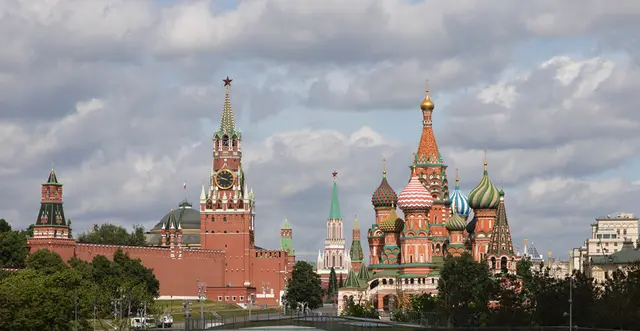Photo taken on June 3, 2019 shows the Kremlin Palace (L) and the Saint Basil's Cathedral in Moscow, capital of Russia. (Xinhua/Bai Xueqi)
The Federal Security Law and the National Security Strategy are the two pillars of Russia's legal system for national security.
MOSCOW, May 28 (Xinhua) -- Russia has put in place a set of laws, each of which has different priorities, to ensure national security and people's safety.
The Federal Security Law and the National Security Strategy are the two pillars of Russia's legal system for national security.
Russia enacted the Federal Security Law in 1992 and updated it in December 2010. The law stipulates principles and measures to ensure national security, social security, ecological security, personal safety and others.
The Federal Security Law allows the Russian president to declare, in accordance with the constitution, a state of emergency in the whole or part of the country.
In accordance with the Federal Constitutional Law on State of Emergency, a state of emergency should not be declared until there is a direct threat to people's lives, their safety or the constitutional system and the threat cannot be eliminated without introducing a state of emergency.
Such threats include attempts to change the constitutional system by force, seizing power, armed rebellion, massive riots, terrorist acts, blocking or seizing important facilities or areas, activities of illegal armed groups, and inter-ethnic, inter-confessional or regional conflicts that directly endanger Russian citizens and disrupt the operation of federal or local governments.
The Federal Constitutional Law on State of Emergency stipulates that police, security services and the National Guard, in special cases the armed forces, can be deployed to implement the state of emergency.
The National Security Strategy, a fundamental document of Russia's national security strategic planning, aims to ensure the country's national security and long-term stable development.
The latest version of the strategy adopted in 2015 specifies security-related national interests, priorities, purposes, tasks and measures.
In handling its independent domestic and foreign affairs, Russia faces obstructions from the United States seeking hegemony and its allies, the strategy says when describing Russia's external environment.
The West counteracts integration processes in Eurasia and creates hotbeds of tensions in the region, while it is not rare to see the overthrowing of legitimate governments and fanning chaos and conflicts in other countries, the document says.
Some foreign or international non-governmental organizations and individuals attempt to undermine Russia's unity and territorial integrity, interfere with the country's internal affairs, destabilize its society, stir up "color revolutions" and erode Russia's traditional moral values, it adds.
Both the Russian Criminal Code and the Administrative Offenses Code penalize the acts of secession.
In accordance with the Criminal Code, those who publicly and verbally instigate actions aimed at undermining the territorial integrity are subject to up to three years in prison. If the perpetrators do so via media or online, they will face up to five years in jail.
The Criminal Code qualifies violence, such as attacking and mashing, used in order to split Russia as "extremist activities."
Those who publicly incite such activities through the Internet or telecom network are punishable by up to five years behind bars. Organizers of secession acts can be sentenced to up to 12 years in prison, and funders up to ten years.
The Administrative Offenses Code applies to minor violations. For example, those who produce or distribute materials of an extremist nature could serve 15 days of administrative detention with the confiscation of instruments for illegal activities. ■
 简体中文
简体中文










